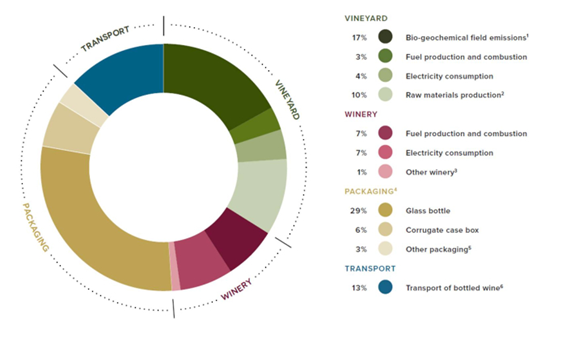The wine industry is both a contributor to climate change and is impacted by it in significant ways. Key contributors to the industry’s carbon footprint include the production of glass bottles, transportation, and the energy-intensive processes involved in grape cultivation and winemaking. Glass bottle production requires high-temperature manufacturing, which generates substantial carbon emissions. Additionally, storing and transporting wine – often requiring refrigeration – consumes considerable energy, particularly in facilities powered by fossil fuels, leading to the release of greenhouse gases (GHGs) into the atmosphere.
Other contributing factors include the cultivation of vineyards, which utilize significant land, leading to deforestation and habitat loss. Deforestation releases stored carbon, exacerbating climate change by reducing the capacity of forests to absorb carbon dioxide (CO2). Wine production, particularly in very dry regions, can be highly water-intensive, leading to irrigation practices that deplete water resources and negatively impact local ecosystems.
Relative Impacts for the Carbon Footprint of Packaged Wine, Cradle-to-Retail Gate

The Impact of Climate Change on Wine Production
Climate change has significantly impacted wine regions worldwide, affecting both the quality and quantity of wine production. For example, rising temperatures are causing grapes to ripen earlier in the season, leading to altered harvest times and potential quality issues. Warmer temperatures can increase alcohol content in wines, affecting their flavor profile and balance. Additionally, they can reduce grape acidity, making wines less refreshing and more susceptible to spoilage. Changes in temperature and sunlight can also impact the development of flavors and aromas in grapes, significantly altering the overall character of the wine.
Changes in precipitation patterns are increasing the frequency and severity of droughts, leading to water scarcity and negatively impacting grapevines and yields. While extreme rainfall events can damage vineyards and increase the risk of diseases and pests, prolonged periods of extreme heat stress grapevines, leading to reduced fruit quality. Finally, late spring frosts can damage young vines and buds, impacting the upcoming harvest.
Sustainable Winemaking Practices
- Precision viticulture: Utilizing sensors, drones, and data-driven tools, precision viticulture enables vineyards to precisely monitor and manage various aspects, including soil moisture, nutrient levels, plant health, crop yield, and quality. This data-driven approach allows for optimized irrigation, targeted fertilization, and early detection and treatment of diseases and pests, all while maintaining high quality standards.
- Sustainable water: These techniques encompass integrated water resource management, water conservation, water reuse and recycling, water pricing, public awareness and education, and sound water policies and governance.
- Integrated pest management: These programs utilize current, comprehensive information on the life cycles of pests and their interaction with the environment to manage pest damage in the most economical way possible, minimizing hazards to people, property, and the environment.
- Organic and biodynamic farming: Driven by a growing consumer demand for sustainable and natural products, organic and biodynamic farming practices have gained significant traction in the wine industry. These practices emphasize minimizing the use of synthetic chemicals, promoting biodiversity, and improving soil health.
- Renewable energy: By adopting renewable energy sources like solar and wind power, wineries can reduce their environmental impact, lower energy costs, decrease GHG emissions, and enhance their brand image as sustainable businesses. While initial investments and technical expertise are required, the long-term benefits of renewable energy make it a compelling choice for a sustainable future within the wine industry.
Case Studies of Sustainable Wineries
Benziger Family Winery
Benziger Family Winery is a leader in biodynamic viticulture, prioritizing soil health and ecosystem balance. Key practices include composting, cover cropping, and integrating animals like sheep and chickens. The winery emphasizes natural pest control, minimizes synthetic inputs, and utilizes biodynamic preparations aligned with lunar cycles. Benziger also protects natural habitats, conserves water, and educates visitors about sustainable practices.
Domaine Serene
Domaine Serene, a leader in sustainable viticulture, prioritizes practices that minimize its environmental impact while also enhancing the quality of its wines. These methods include cover cropping, green manure, and minimal tillage, which improve soil health and reduce erosion. At the same time, Domaine Serene prioritizes water conservation through practices like dry farming, which eliminates the need for supplemental irrigation, encouraging deeper root growth in the vines and resulting in more intense flavors and aromas in the grapes. This water conservation strategy preserves precious water resources. Furthermore, Domaine Serene explores renewable energy sources and implements energy-efficient practices. The winery also minimizes waste through careful planning and robust recycling programs.
Domaine Bousquet
Domaine Bousquet, an Argentinian winery, practices organic farming across all its vineyards, with 50% cultivated biodynamically, with a goal of 100%. The winery demonstrates a strong commitment to environmental sustainability through efficient irrigation techniques, achieving an impressive 96.8% waste recycling rate, and aiming for carbon neutrality by 2030.
Conclusion and Recommendations
The wine industry contributes to climate change through glass bottle production, extensive transportation, and energy-intensive viticultural and winemaking practices, necessitating a shift towards more sustainable operations. At the same time, the industry faces severe threats from climate change. These threats include rising temperatures, changes in precipitation patterns, and frequent extreme weather events that directly impact grape quality and yield, jeopardizing the future of wine production.
To counter these challenges, the industry must prioritize sustainable practices including implementing precision viticulture techniques to optimize resource use, such as conserving water, embracing organic and biodynamic farming methods, adopting renewable energy sources, and establishing robust waste management systems. Research and innovation also play a crucial role, including the development of climate-resilient grape varieties, refining sustainable winemaking techniques, and exploring carbon sequestration strategies to mitigate the industry’s environmental impact.


